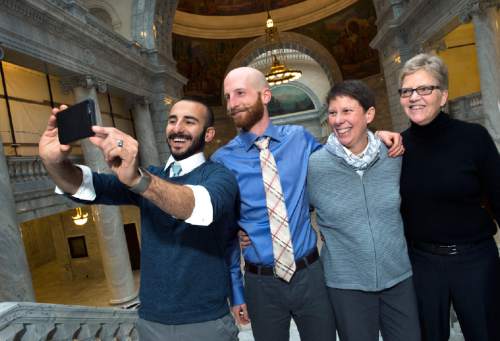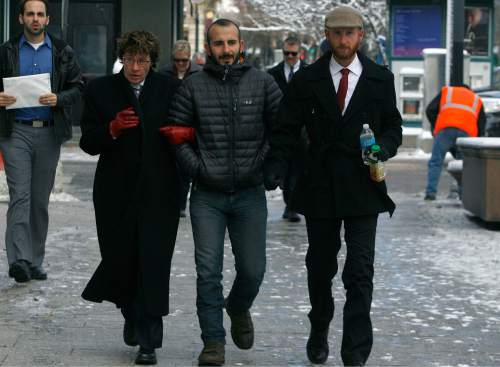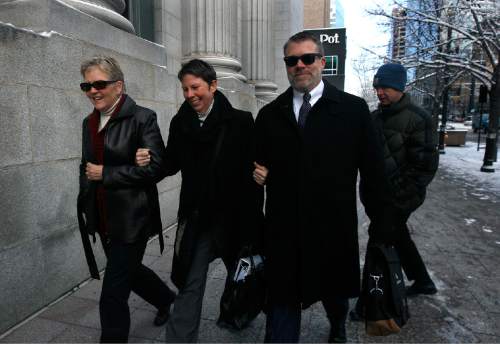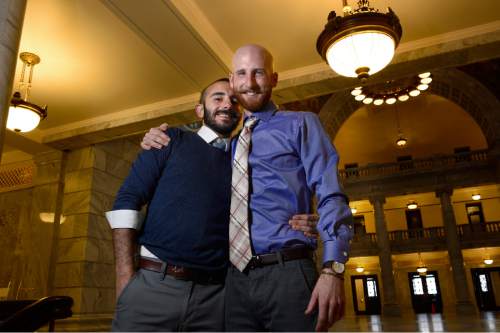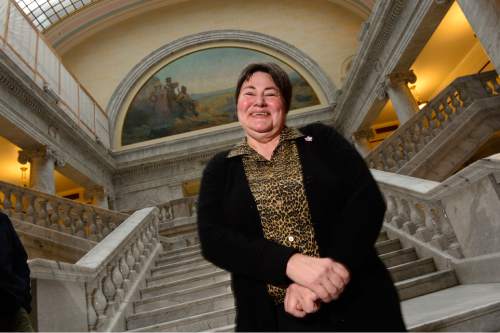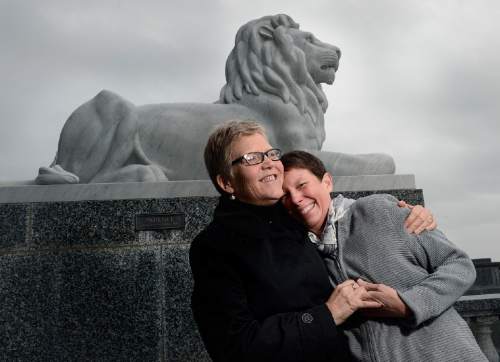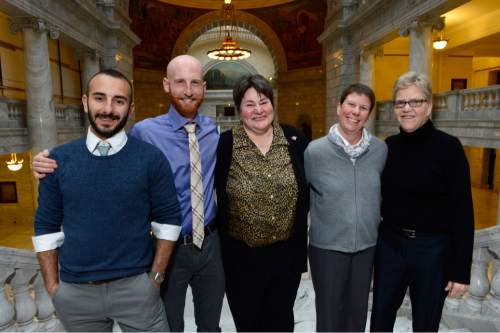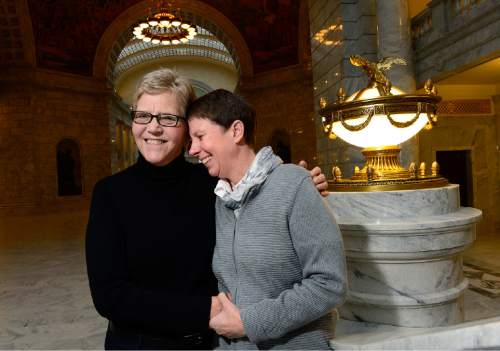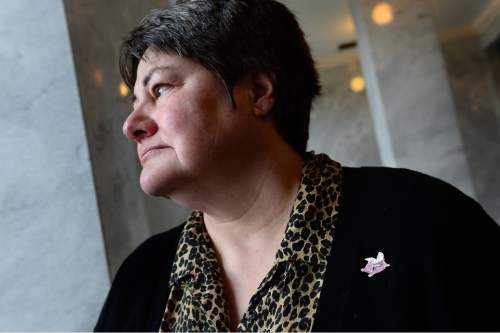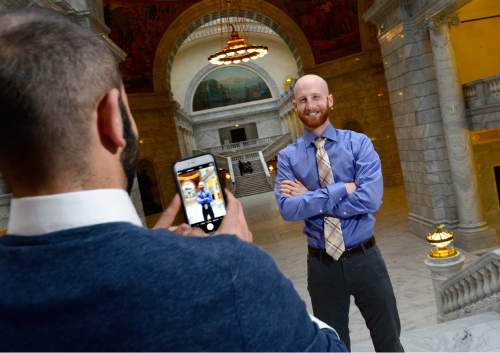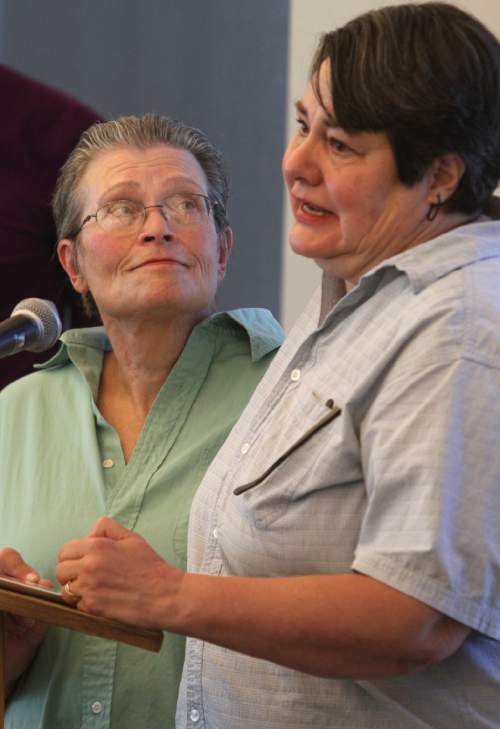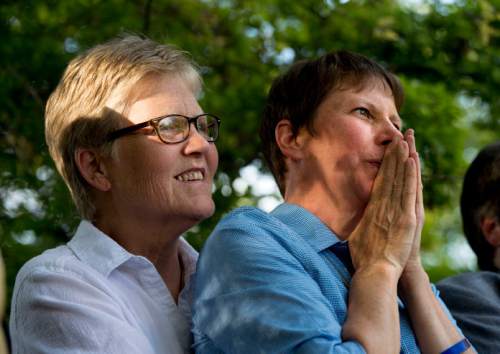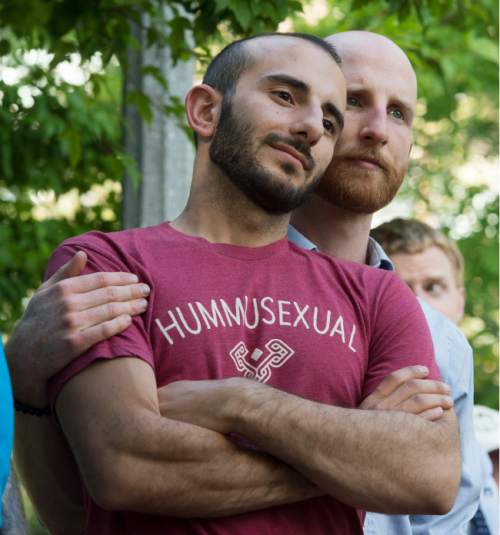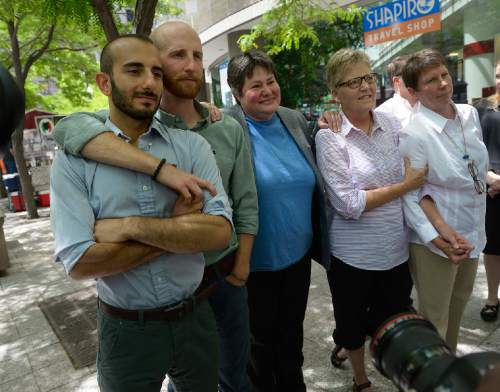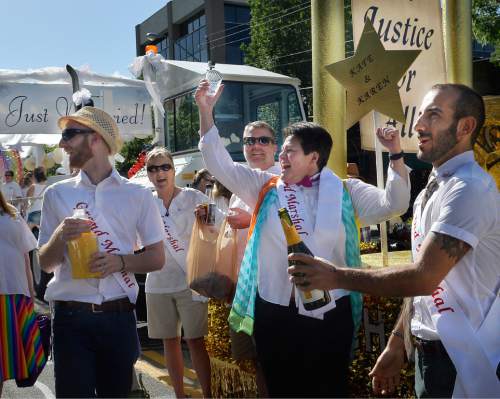This is an archived article that was published on sltrib.com in 2014, and information in the article may be outdated. It is provided only for personal research purposes and may not be reprinted.
Editor's note • The Salt Lake Tribune asked all six plaintiffs in Kitchen v. Herbert the same set of questions about their lives, their experiences participating in the lawsuit and the impact they believe the case has had on Utah and the nation. Here are their edited responses:
Why did you decide to be plaintiffs in the case and was it important to be involved despite any risks?
Kate Call • There was no question about us being plaintiffs. It was what we had to do. We wanted it to come here as soon as possible because [partner] Karen [Archer] was ill and didn't have a lot of time. It needed to be done for a lot of reasons — for people who had kids, or wanted to adopt or had end-of-life issues, like we have, for all kinds of reasons. I'd already been fired for being gay and my parents were deceased. I didn't have a lot to lose and I figured I had everything to gain.
Derek Kitchen • We felt that we had an obligation as citizens, if we see something that's not fair or not right, to stand up and challenge some injustice. There were a couple of risks: The most immediate was that we would jeopardize our business, which was new. So that was one calculation that we were really scared of — losing customers. Also, there was this concern that it wouldn't be the right time in legal history. And then there was just the risk of putting ourselves out there and being exposed and having our families exposed. Those are the risks we thought about and decided, it doesn't matter, this is the right thing to do.
Kody Partridge • My understanding was that [the attorneys] wanted a couple who had committed to each other who had not married. And I came home and said [to partner Laurie Wood], 'Would you like to join a lawsuit on Amendment 3.' Laurie, she was just the backbone of steel and said, 'We need to do this.' But I didn't realize how big of a case it would be. Once I had the blessing of Rowland Hall, I was most nervous about my father and his sense of privacy.
What was it like to sit in Utah's U.S. District Court and listen to your attorney Peggy Tomsic argue the case?
Call • It was transcendent. I remember her voice was trembling a little with emotion, and perhaps with fright for her. And I thought, 'Go, Peggy; go, Peggy, we are so behind you!' Every question [Judge Robert J. Shelby] had she had an answer plus, plus. I was shaking with the temerity of it all, and the excitement and the beauty of her standing there, and I will never forget what that was like.
Moudi Sbeity • We walked from Peggy's office in the U.S. Bank building and when we got to the courthouse, the cameras started to click. My initial reaction was, let's turn around and go back. We did not expect people to be there. We did not expect the news media. There's a lot of legal jargon we did not understand, but it was very exciting. [Peggy] was on fire. She knew her stuff and my initial reaction, when she made an argument I agreed with, was to clap. I felt confident we would win, but I have a very biased point of view.
Laurie Wood • Judge Shelby's first comment was, 'Will I be the first federal judge to rule since Windsor [the case that struck down the federal Defense of Marriage Act]'? And Peggy said, 'Yes, you will be.' Now, with hindsight, that's such an interesting exchange. We had no idea what to expect … and I'm sure Peggy heard a lot of 'not now, not this place' … but she never doubted.
What do you make of the changes across the country during the past year?
Karen Archer • It's as it should be and all the other [states] will have to follow.
Sbeity • It happened so fast, and I think it's cool to think that Kitchen v. Herbert is the thing that made it happen so fast. It gives me such a sense of purpose. We can move forward with a sense of satisfaction.
Partridge • This is like love amplified. What is just so lovely, you know, that this was a ripple effect. It was like a tsunami. I have to credit Judge Shelby for writing a decision that would resonate with other judges.
Were you disappointed that the U.S. Supreme Court decided not to settle the issue for the country, and do your fear it could rule against marriage equality later?
Call • I am because I wanted it to be settled for the entire U.S. However, for Karen and me, it was better the way it happened because it automatically just made us married. I don't fear it will go away. The most [the courts] could possibly do, if they had gall galore, would be to have things remain as they are and leave [marriage] up to states or circuit courts. I think that's unlikely. I don't think that anyone will take rights away.
Kitchen • We would have loved to have had a 50-state solution to this. But once we started to think about it, we realized we accomplished everything we set out to do to bring marriage equality to Utah.
Partridge • I don't want to be naive, and we've said we have to respect this process, but at the same time, there are now 35 states where marriage is legal, where people have gotten married, where people have adopted children, under the eyes of not just the federal government but those state governments. You know, [playwright] Tony Kushner said in "Angels in America" that the world only spins forward. I would like to believe we are a nation that understands that once you've extended a right, you would not take that right away.
What have you learned about yourselves as individuals and as a couple?
Call • I am different because now I believe something which I never believed before, which is that an individual can make a difference in the entire flow of history, in the rule of national law and in the course of individuals' lives. And while I've always had a healthy self-esteem, it never encompassed that level of ability or power. Initially I did not want to be the face of this movement ... overweight, older … I didn't want to be photographed. Karen said to me, 'Don't you ever say that. There are all kinds of older lesbians and gay men who have you to look up to.'
Kitchen • The big thing was not to presuppose any one person is on one side or the other of an issue and not to be afraid of opening dialogue. For me, it's been about just finding the courage to speak my mind authentically. I feel like I came into my own as an adult during the case. There was also a lot of stress outside of our relationship that manifested itself in our interpersonal relationship and our communication skills … so we really grew as a couple.
Partridge • We felt like our world was expanded. We got to meet so many individuals, not just in the gay community, but in the [wider] community. Laurie and I would be walking [our dog] and have somebody come up and say thank you. It's been lovely to see that community support. Going through this, we've turned to each other, and we are stronger as individuals and stronger as a couple.
Do you feel the weight of history and did you think you would leave a mark on history?
Archer • If not us, then someone else would have taken our places. It is indeed an honor to have participated in this civil-rights case.
Kitchen • All along we knew we were in the middle of something that would adjust the calculation for equality for gay people for a long time. We just felt blessed and lucky to be involved in that. We also did feel the sense like we can't let our experience go undocumented, so we spent the last 18 months noting in our personal journals, and to each other and friends and family, the things that were important to us.
Wood • I feel like the weight of history is now off. I really feel relieved. It's kind of hard to reconcile being a part of history. I'm sure Paul Revere didn't say, 'Oh, yeah, I'm a part of history.' I always hoped I would be that kind of person. I hoped that I would be the 'if not me, then who' person — that I would actually step up. So I'm happy that I was and we did.
What do you think those who oppose same-sex marriage don't understand about the conversation?
Call • That we are just like they are. They have 'otherized' us, and the only reason we have come as far as we have is because we have come out to friends, family, bosses, co-workers. … Instead of knowing us as individuals, they have seen us as a class of people who are undesirable. I think marriage will help us turn the corner [on bias and discrimination] if only because it puts more focus on us and on our lives. We certainly are in the conversation more now that we were even five years ago, especially Utah gays and lesbians. I'm so happy for any of us who come out. It's good for your own psyche, and it's good for everyone else, too, just to know our variety and our foibles and our numbers.
Sbeity • I don't think that there is anything to say. Most of their fears were fears of the unknown, and now that marriage is here, they just have to wait and see. If they have the will in them for a change of heart, then they can come and meet us, and talk to us and break bread, but we cannot change someone else's mind if they are not willing to. That's such a personal struggle that we can't do anything for them. I understand fear, but I don't understand the logic of their fear.
Partridge • I would encourage them to listen to the stories. I just can't believe there are many people anymore who don't know somebody [who is gay] in their family, in their workplace, in their neighborhood. If they really look around, they can't see somebody whose life hasn't been touched. They'll see, Derek and Moudi are small-business owners and make really delicious hummus. Laurie and I are teachers. Laurie helps take care of her mother, and I'm the youngest of five children. We're just regular people. And I want to hear their stories.
Where does religion and religious freedom fit into this conversation?
Archer • Same-sex marriage is a civil, legal matter. Marriage may be considered religious by many, and that is OK for them, but they still have to get married legally for it to be recognized by the state.
Kitchen • Marriage is administered by the state, which ought not be linked to religion. This case has actually extended religious freedom. Churches that have been prevented from performing same-sex marriages can now be liberated to do so. The freedom to marry in no way forces any religion to perform weddings for same-sex couples.
Partridge • Judge [Carlos] Lucero said [in the 10th U.S. Circuit Court of Appeals decision], this isn't about anybody's religious freedom. This is about recognizing legal rights and responsibilities. I respect people's faith and how they want to practice their religion. I think if the Supreme Court takes a case, and I believe they will, I believe it can be a win-win for all of us — that you can have your faith respected, and we can also be a nation where rights and laws are respected.
What would you say to Gov. Gary Herbert, Attorney General Sean Reyes and other state leaders who worked to preserve Utah's ban on same-sex marriage?
Call • Good fight. I understand why you did it and if I had been in your position, I possibly would have done the same thing. I understand you. I come from you. I don't necessarily excuse, however, because I think if you're a public leader, you need to explore the issues a little fuller. Reyes came up to us in the courtroom in Denver and knelt in front of each couple and said, 'I want you to know it's not personal.' I gave him a pass. I understand it's the process, and you have to go through it, but I feel bad that I gave him a pass.
Kitchen • I would ask him about Medicaid and lot of other political issues, but I wouldn't have anything to talk to him about with regard to marriage equality. It's said and done. He played his part, we played our part, and we were both respectful to each other most of the time. Although I don't understand why he fought the way he did, it doesn't matter anymore.
Partridge • I do think [the governor] was gracious on Oct. 6 [when the U.S. Supreme Court essentially cleared the way for same-sex marriage in Utah] and I think he thought he was defending a law he needed to defend. They were doing their duty. But in light of the decision, I hope Attorney General Reyes and Gov. Herbert and every member of his Cabinet take time to talk to the families whose lives have been touched and see the contributions we make to this community. I think we have chance to be a stronger community because of this.
What would you like to say to Judge Shelby?
Call • You are my hero. I have incredible respect for him — I would for any judges, no matter what decision they had made, if I felt they had been as objective and fair as possible. I just appreciated that about him.
Kitchen • I would thank him for being an impartial, levelheaded, realistic judge and a man of the law. I think he did everything the right way. He ruled favorably not because he's biased, but because it was the right thing to do. I would want to give him a hug. And I would like to know what kind of person he is on other issues.
Wood • Thank you for standing on the side of justice. I think he did what was right, and I don't think it was because he wanted to make history. I don't think it was because he favored one side or the other. I really, really believe he saw a wrong that needed to be made right.


